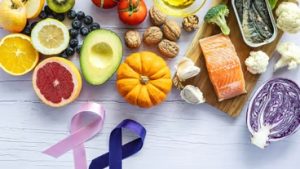In a world where health remains a primary concern, many people are increasingly interested in how nutrition can support their well-being and potentially combat diseases, including cancer. This article delves into the best foods known for their cancer-fighting properties. We will discuss why certain items are classified as ‘top cancer foods’ and how they influence our health. You may wonder which vitamins or nutrients are beneficial, how to include these foods in your daily diet, and whether they can truly make a difference in cancer prevention. Let’s explore the best options available.
Berries: Nature’s Tiny Powerhouses
Berries such as blueberries, strawberries, and raspberries are rich in antioxidants, particularly flavonoids, which are known for their cancer-fighting properties. These small yet mighty fruits contain high levels of vitamins C and K, as well as dietary fiber.
Research suggests that compounds found in berries can help reduce inflammation and slow down the growth of tumor cells in laboratory studies. For instance, a study published in the journal Cancer Prevention Research found that mice consuming blackberry extract saw a significant reduction in tumor growth. Incorporating a variety of berries into your diet can be simple; add them to smoothies, salads, or yogurt for a nutritious boost.
Moreover, the bright colors of berries indicate the presence of beneficial phytochemicals, which can promote overall health and well-being.
Cruciferous Vegetables: The Green Warriors
Cruciferous vegetables, including broccoli, cauliflower, kale, and Brussels sprouts, are known for their unique ability to enhance detoxification in the body and combat cancer development. These vegetables contain glucosinolates, which break down into compounds that may help prevent cancer by inhibiting the growth of cells.
Scientists at the American Institute for Cancer Research highlight that a diet rich in cruciferous vegetables can play a protective role against cancers of the lung and colon. To reap these benefits, aim to fill half your plate with vegetables at meals.
Steaming or lightly sautéing these vegetables can help preserve their nutrients. Experiment with different recipes to keep your meals interesting while nourishing your body with these cancer-fighting greens.

Top cancer foods to support your well-being
Fatty Fish: Omega-3 Rich Delights
Fatty fish such as salmon, mackerel, and sardines are nutritional heroes thanks to their high omega-3 fatty acid content. Omega-3s are known for their anti-inflammatory properties and may hinder the growth of tumor cells.
Research suggests that individuals who consume omega-3s regularly have a lower risk of breast and prostate cancers. The American Heart Association recommends at least two servings of fatty fish each week as part of a balanced diet. To incorporate these fish into your meals, consider grilling, baking, or adding them to salads or pasta dishes.
Furthermore, these fish provide a healthy dose of protein and essential nutrients, making them a valuable component of a cancer-fighting eating plan.
Whole Grains: The Fiber Fighters
Whole grains like quinoa, brown rice, and whole wheat bread are packed with dietary fiber and essential nutrients, playing an important role in digestive health. Studies indicate that diets high in fiber can lower the risk of developing colorectal cancer. In fact, a large-scale analysis revealed that individuals consuming more whole grains had a significantly reduced risk of various types of cancer.
Beyond fiber, whole grains contain antioxidants and phytochemicals, which contribute positively to our overall health. Opt for whole grains instead of refined grains to increase nutrient intake.
Try swapping out white rice for quinoa, or enjoy oatmeal for breakfast instead of sugary cereals. The versatility of whole grains makes it easy to include them in your diet, enhancing not only flavor but also health benefits.
Legumes: The Protein Powerhouse
Legumes such as beans, lentils, and peas are excellent plant-based protein sources, and they stand out for their heart-healthy fiber and low fat content. A diet that incorporates legumes has been closely linked to a decreased risk of certain cancers, particularly colorectal cancer. The fiber in legumes aids in digestion and keeps you feeling full, which can be beneficial for maintaining a healthy weight.
Research published in the Journal of Nutrition suggests that increasing legume consumption may lower cancer risk by positively influencing hormonal levels and decreasing inflammation. In addition to their preventive properties, legumes are also a cost-effective protein source, ideal for families and budget-conscious eaters.
Consider adding black beans to your salads, or prepare a hearty lentil soup for a comforting meal. The versatility of legumes makes them an easy addition to various dishes.
Summary of Essential Cancer-Fighting Foods
The incorporation of specific foods into your diet can greatly influence your overall health, especially when it comes to cancer prevention. Berries provide antioxidants that may slow tumor growth, while cruciferous vegetables offer detoxification benefits; both are invaluable components of a balanced diet. Fatty fish supply omega-3 fatty acids, which can reduce inflammation, and whole grains contribute fiber that bolsters digestive health. Legumes serve as protein powerhouses, enhancing nutritional intake and supporting a healthy weight.
Ultimately, adopting a diverse diet rich in these top cancer foods can not only elevate your health but also reduce the risk of cancer. Whether you aim for vibrant fruits or hearty grains, prioritize these foods to advocate for your well-being. Staying informed and making healthier choices today can have a lasting impact on your health tomorrow.